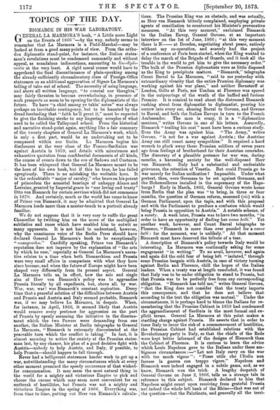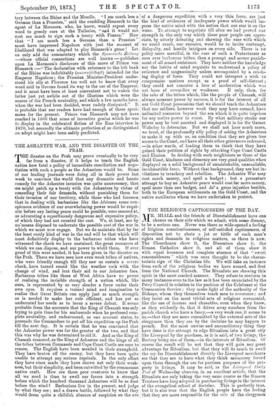TOPICS OF THE DAY.
BISMARCK IN HIS WAR LABORATORY.
GENERAL LA MARMORA'S book, "A Little more Light on the Events of 1866 "—by the way, nobody seems to remember that La Marmora is a Field-Marshal—may be looked at from a good many points of view. From the ortho- dox diplomatic stand-point, for instance, the Italian states- man's revelations must be condemned summarily and without appeal, as scandalous indiscretions, amounting to lese-diplo- matie at the very least. A rigid moral censor would have to apprehend the final discontinuance of plain-speaking among the already sufficiently circumlocutory class of Foreign-Office statesmen as an additional aggravation of Signor La Marmora's telling of tales out of school. The necessity of using language, and above all written language, "to conceal our thoughts," may fairly threaten to become overwhelming, in presence of such prospects as seem to be opening for the diplomatists of the future. To have "a chiel amang ye takin' notes" was always perhaps an inevitable contingency, but to be haunted by the dread foreboding that "faith he'll prent it," must be expected to give the finishing stroke to any lingering scruples of what used to be called the Talleyrand school. From the historical and narrative stand-point again, anything like a fair summary of the twenty chapters of General La Marmora's work, which is only a first part, would be an undertaking not to be compassed within our limits. La Marmora begins his disclosures at the very close of the Franco-Sardinian war against Austria in 1859, and details with minuteness and exhaustive quotation from confidential documents of all kinds, the course of events down to the eve of Sadowa and Custozza. It has been whispered that General La Marmora meant to be the hero of his own book, but if this be true, he has failed egregiously. There is no mistaking the veritable hero. It is the redoubtable "major of cavalry," who bears on his patent of princedom the armorial bearings of unhappy Alsace and Lorraine, granted by Imperial grace to "our loving and trusty" Otto von Bismarck for certain services which did not commence in 1870. And certainly, much as the world has come to know of Prince von Bismarck, it may be admitted that General La Marmora lends more than a master-touch to a portrait already familiar.
We do not suppose that it is very easy to ruffle the great Chancellor by twitting him on the score of the multiplied subtleties and ruses which have enabled him to outwit so many opponents. It is not hard to understand, however, why the unanimous voice of the Berlin Press should have declared General La Marmora's book to be exceptionally
unangenehm." Candidly speaking, Prince von Bismarck's reputation does not improve by the explanation of "the arts by which he rose," especially as General La Marmora's narra- tive relates to a time when both Bismarckism and Prussia were very small affairs in comparison with what they have since become, and when the future of Europe might have been shaped very differently from its present aspect. General La Marmora tells us, in effect, how the sole and single aim of Herr von Bismarck's policy was to aggrandise Prussia literally by all expedients, but, above all, by war. War, war, war was Bismarck's constant aspiration. Every time that a peaceful solution of the difficulties between Austria and Prussia and Austria and Italy seemed probable, Bismarck was, if we may believe La Marmora, in despair. When, for instance, in April, 1866, it seemed likely that Austria would remove every pretence for aggression on the part of Prussia by openly assuming the initiative in the disarma- ment which the two Powers were demanding from one another, the Italian Minister at Berlin telegraphs to General La Marmora, "Bismarck is extremely discontented at the peaceable turn which the conflict is taking." In fact, it is almost amusing to notice the anxiety of the Prussian states- man lest, by any chance, his plan of a good decisive fight with Austria—nobody to help Austria, and Italy, if possible, to help Prussia—should happen to fall through. Never had a belligerent statesman harder work to get up a war, notwithstanding the many circumstances which at every other moment promised the speedy occurrence of that wished- for consummation. It may seem the most natural thing in the world for a mighty and victorious Empire to pick and choose the excuse which may seem most convenient for an outbreak of hostilities, but Prussia was not a mighty and victorious Empire in the spring of 1866. Everything was, from time to time, putting out Herr von Bismarck's calcula- tions. The Prussian King was an obstacle, and was actually, as Herr von Bismarck bitterly complained, employing private agents of conciliation to counteract his Minister's provocative measures. "At this very moment," exclaimed Bismarck. to the Italian Envoy, General Govone, at an important. interview on the 1st of June, 1866; "at this very moment there is N— at Dresden, negotiating about peace, entirely without my co-operation, and scarcely had the project of a conference at Paris been started, when the King wanted to delay the march of the Brigade of Guards, and it took all the trouble in the world to get him to give the necessary order."' The bulk of the Prussian diplomatists were as little disposal as the King to precipitate matters. "Bismarck," telegraph& Count Barral to La Marmora, "said to me yesterday with. extraordinary vivacity that the entire Prussian diplomacy was working against his war plans," and neither Bernstorff at London, Goltz at Paris, nor Usedom at Florence was spared in the outpourings of the wrath of the baffled and furious. Premier. It is comical to read about the distressed Bismarck rushing about from diplomatist to diplomatist, pouring his. sorrow into every ear, abusing Barral to Govone, and Govone to Barral, and both the Italian Envoys in turn to the French Ambassador. The man is crazy, it is a " diplomatico maniaco," writes Govone in one of his letters. Assuredly,. Bismarck "trailing his coat" must have been a curious study. Even the Army was against him. "The Army," writes Govone, "is not for a war against Austria ; the Austrian Army can still count many sympathies." It required a hard wrench to pluck away those Prussian soldiers of seven years- ago from feelings of brotherhood for their Austrian comrades.. The discovery of a plausible pretence for war was, during months, a harassing anxiety for the well-disposed Herr von Bismarck. Italy had a substantial and undeniable grievance, the retention of Venetia. But could Prussia go to. war merely for Italian unification ? Impossible. Under what pretext, then, were Germans to be set against Germans, and the Hohenzollerns installed in the supremacy of the flaps-- burgs?Early in March, 1866, General Govone wrote home from Berlin that the plan was "to bring, in three or four months, the question of German reform seasoned (sic) with a German Parliament, upon the tapis, and with this proposal and with the Parliament to produce a confusion which would bring Prussia in opposition to Austria." A notable scheme, of a surety. A week later, Prussia was to have two months, "in order to have an opportunity of finding her cane belli." Yet anotherweek, however, and Count Barral telegraphs to Florence, "Bismarck is more than ever puzzled for a casu. belli : for the moment, war is unlikely." At that moment Bismarck must have deserved the tribute of a tear.
A description of Bismarck's policy towards Italy would be interesting. La Marmora was continually asking for some engagement "in writing." To no avail, however, and again. and again did the cold fear of being left "isolated," through some Prussian bargain with Austria, in ease of victory turning against Berlin and Florence, chill the hopes of the Italian leaders. When a treaty was at length concluded, it was found that Italy was to be under obligation to stand to Prussia, but that Prussia was to be perfectly free from any corresponding obligation. "Bismarck has told me," writes General Govone, "that the King does not consider that the treaty imports this consequence, and that he does not believe that according to the text the obligation was mutual." Under the circumstances, it is perhaps hard to blame the Italians for re- membering that the Prussian Cabinet in 1859 had condemned the aggrandisement of Sardinia in the most formal and ex- plicit terms. General La Marmora at this point makes a startling charge against Prussia. He asserts that in order to force Italy to incur the risk of a commencement of hostilities, the Prussian Cabinet had established relations with the Revolutionary party in Italy, so that the chiefs of the Reds were kept better informed of the designs of Bismarck than the Cabinet of Florence. It is curious to learn the advice which Louis Napoleon gave to the Italians under these am- biguous circumstances :—" Let not Italy carry on the war with too much vigour ": "Fosse utile che l'Italia non facesse la guerra con troppo vigore." Napoleon and Bismarck were indeed engaged in a subtle game, and, as we know, Bismarck won the trick. A lengthy despatch of General Govone on June 2, 1866, tells us a strange tale in reference to this subject. Bismarck declared to him that Napoleon might count upon receiving from grateful Prussia not indeed the whole left bank of the Rhine—that was out of the question—but the Palatinate, and generally all the tern- tory between the Rhine and the Moselle. "I am much less a German than a Prussian," said the confiding Bismarck to the agent of La Marmora, who, he knew, would repeat every word to greedy ears at the Tuileries, "ad it would not -cost me much to sign such a treaty with France. How that "I am much less a German than a Prussian" must have impressed Napoleon with just the amount of likelihood that was adapted to play Bismarck's game ! Let -us only add the commentary which the Spenersche Zeit any —whose official connections are well known — publishes upon La Marmora's disclosure of this move of Prince von Bismarck :—" The declaration with reference to the left bank of the Rhine was indubitably (unzweifelhaft) intended for the Emperor Napoleon ; the Prussian Minister-President under- stood his ally at Florence too well not to know that every word said to Govone found its way to the ear of the Emperor, and it must have been at least convenient not to waken the latter just yet awhile out of the illusions which were the -source of the French neutrality, and which a few months later, when the war had been decided, were rudely dissipated." It is probable that our readers have had enough of these speci- mens for the present. Prince von Bismarck may not have reached in 1866 that acme of inventive genius which he was to display in the celebrated fiction of the Ems interview in 1870, but assuredly the ultimate perfection of so distinguished an adept might have been safely predicted.































 Previous page
Previous page